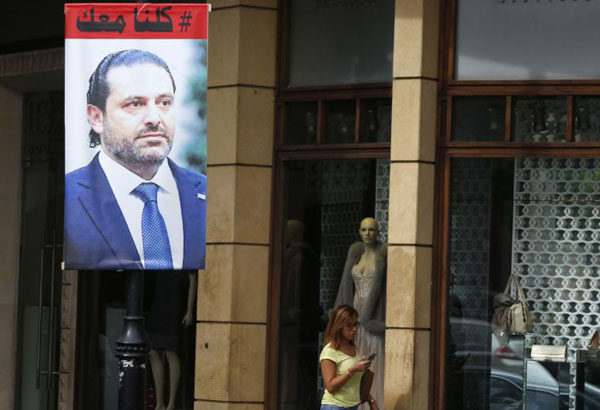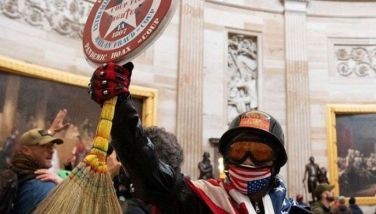Lebanese Cardinal: PM's return home from Saudi essential

A poster of resigned Lebanese Prime Minister Saad Hariri with Arabic that read, "We are all with you," hangs on a street in Beirut, Lebanon, Monday, Nov. 13, 2017. Cardinal Bechara el-Rai, who heads the Maronite sect, Lebanon's biggest Christian community and the Middle East's largest Catholic church, is to head to Saudi Arabia and is expected to meet with Hariri, in a visit he had planned before Hariri announced his resignation. (AP Photo/Hassan Ammar)
BEIRUT — The head of the Maronite Catholic community in Lebanon said yesterday that the return of Prime Minister Saad Hariri back home from Saudi Arabia, where he recently announced his resignation, will restore normal life to the country that was shaken by his move.
Cardinal Bechara el-Rai told reporters before departing to Saudi Arabia that the Lebanese people have been "unsettled" since Hariri's resignation earlier this month, adding that he will raise the matter with the Saudi king and crown prince.
El-Rai had planned his two-day visit before Hariri announced his Nov. 4 resignation — in a pre-recorded statement broadcast from Riyadh — plunging Lebanon into crisis and leading to speculation that he was being held against his will.
El-Rai heads the Maronite sect, Lebanon's largest Christian community and the Middle East's largest Catholic church, which enjoys wide influence in the country. He said his visit is the first by a Maronite patriarch to the kingdom ever.
Hariri said on Sunday he'll return to Lebanon "within days" to resolve issues with the militant group Hezbollah, his rivals in the coalition government.
The comments came in Hariri's first TV interview since announcing his resignation. He denied he was being held against his will in the kingdom.
Hariri, a Saudi ally with dual citizenship, sounded less belligerent in Sunday's interview than he did during his resignation announcement, in which he blasted Hezbollah and the militant group's patron, Iran, and said he feared for his safety.
On Sunday he acknowledged his resignation was unconventional, adding that he was ready to return to Lebanon to formally submit it and seek a settlement with Hezbollah.
"The Lebanese people have been waiting for him (Hariri) to return because the situation has come to a stop and the Lebanese people have been unsettled," el-Rai said. "They (the Lebanese) will not rest until he returns so that life returns to normal."
"We will carry these concerns to the king and crown prince and wish well," he said.
El-Rai and Saudi Charge d'Affaires Walid al-Bukhari said the kingdom is not likely to deport Lebanese citizens as punishment for the participation of the militant Hezbollah group in Lebanese politics.
The kingdom has been demanding that Hezbollah play no role in future government, accusing the group of supporting anti-Saudi Yemen rebels known as Houthis. Hezbollah and the Houthis deny that the Lebanese group is carrying out anti-Saudi activities in Yemen.
Lebanese President Michel Aoun welcomed Hariri's statements and said he hoped Hariri would return to Lebanon soon. Once he returns, Aoun tweeted, "we will listen to him about all circumstances, topics and concerns that need addressing."
Hariri's office said he met several diplomats in Riyadh on yesterday including British and German ambassadors.
The United States, France and Britain have all expressed strong support for Lebanon's stability and sovereignty. A White House statement on Saturday described Hariri as "a trusted partner of the United States in strengthening Lebanese institutions, fighting terrorism, and protecting refugees."
On yesterday, French Foreign Minister Jean-Yves Le Drian said "we are preoccupied by the situation in Lebanon."
"We are worried about its stability, we are worried about its integrity," Le Drian said. He added that Hariri says he is free to move and "we don't have any reason not to believe him. But for there to be a political solution in Lebanon every political official must have total freedom in their movements."
Hariri's interview on Sunday night, carried by Future TV, a channel associated with his political party, raised some new questions.
At times it was evident Hariri was holding back tears in the interview, which went on for over an hour. He repeatedly drank water, finishing his glass and asking for more. He pleaded with the interviewer to finish the questioning and said he was "tired."
He also repeatedly said he was ready to die for Lebanon — his father, former Prime Minister Rafik Hariri, was killed by a car bomb in Beirut in 2005 — but added that he didn't want his children to go through that kind of ordeal. When asked about reports that he is not communicative and doesn't use his phone much, he said: "I am in a reflective state," adding that he didn't want any distractions amid a very busy schedule.
- Latest
- Trending
































